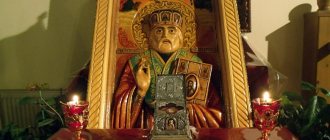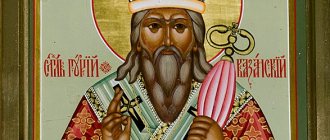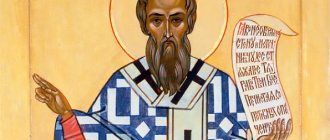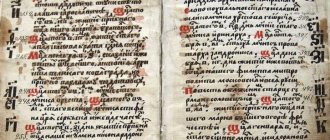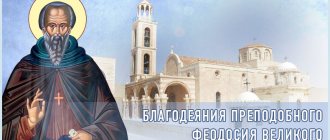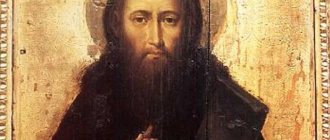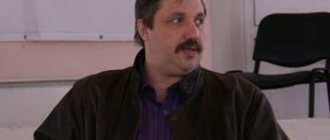| St. Theodosius of Chernigov |
Theodosius (Polonitsky-Uglitsky)
(+ 1696), Archbishop of Chernigov, Saint Memory of February 5, September 9 (discovery and transfer of relics), in the Cathedrals of Bryansk, Vinnitsa, Kiev and Chernigov saints
Born in the early thirties of the 17th century in the Podolsk province. He came from the ancient noble family of Polonitsky-Uglitsky; His parents were priest Nikita and Maria. The piety that reigned in the family of the future saint beneficially contributed to the spiritual development of the boy. From childhood he was distinguished by meekness and diligence in prayer. The young man’s natural abilities were revealed at the Kiev Brotherhood College at the Kiev Epiphany Monastery. The Kiev-Brotherly Epiphany School was at that time the main center of the struggle of Orthodoxy against the attacks of the Catholic clergy, Jesuits and Uniates. During his years of study, Saint Theodosius’s calling to monastic feat was finally confirmed: he devoted all his free time from studies to prayer, contemplation of God, and reading the Holy Scriptures.
It can be assumed that the saint did not complete the full course of the college, since after the destruction of Podol by the Poles, it ceased its activities for several years. Throughout his life, the saint retained deep gratitude to the Kiev-Brotherly Monastery that raised him. In the synodikon of the Kiev-Vydubitsky Monastery the following remark was made about Saint Theodosius: “He was a prudent man and benefactor to the Kyiv Brotherhood Monastery.”
After receiving his education, the future saint took monastic vows at the Kiev-Pechersk Lavra with the name Theodosius, in honor of the Monk Theodosius of Pechersk (his worldly name is unknown).
By the Kyiv Metropolitan Dionysius (Balaban), he was made archdeacon of the Kiev St. Sophia Cathedral, and then appointed vicar of the metropolitan cathedral. But soon he left Kyiv and settled in the remote Krutitsky monastery (Chernigov diocese), near the town of Baturin, famous for its strict monastic life. There he was ordained to the rank of hieromonk. In 1662, Saint Theodosius was appointed abbot of the Korsun monastery of the Kyiv diocese, and in 1664 - abbot of the ancient Kiev-Vydubitsky monastery. This monastery had recently been in the hands of the Uniates and was completely ruined. But Saint Theodosius, thanks to his energy and perseverance, managed to quickly revive the Vydubitsky St. Michael’s Monastery. He took special care to ensure the splendor of the church. He created a wonderful choir, which was famous not only in Little Russia, but also in Moscow, where Saint Theodosius sent his singers in 1685. Caring for the spiritual growth of the inhabitants of the monastery, the holy abbot, himself a strict ascetic, built in 1680 not far from the monastery, on the island of Mikhailovshchina, a small monastery for the brethren who desired solitude. He appointed one of the most zealous monks of the monastery, Hieromonk Job (Opalinsky), as organizer and deputy there.
When Saint Theodosius was hegumen of the Kiev-Vydubitsky Monastery, he had to go through difficult days. Together with other abbots, he was accused by Methodius, Bishop of Mstislav and Orsha, of treason against the Russian government and in imaginary correspondence with traitors to Russia. On September 20, 1668, Saint Theodosius had to give explanations on this matter. On November 17, 1668, the slander was discovered, and Saint Theodosius, along with other abbots, received forgiveness.
The Right Reverend Lazar (Baranovich) appreciated the high spiritual qualities of Saint Theodosius and brought him closer to himself. He called him “a sheep of the flock of Christ who has learned obedience,” and prophetically wished that the name of Saint Theodosius would be written in Heaven. When in 1679 the Right Reverend Lazar became locum tenens of the Kyiv Metropolis, he appointed Saint Theodosius as his vicar in Kyiv, while he himself remained in Chernigov. As the vicar of the locum tenens of the Kyiv Metropolis, Saint Theodosius took an active part in many church events. In 1685, he participated with the right of a decisive vote in the election of Bishop Gideon (Chetvertinsky) as Metropolitan of Kyiv and, together with Jerome (Dubina), abbot of Pereyaslavl, was sent to Moscow with notification of the election. In Moscow, both representatives were received with honor and respect. The result of this embassy was the reunification of the Kyiv Metropolis with the Russian Orthodox Church.
In 1688, Saint Theodosius was appointed archimandrite of the Chernigov Yelets Monastery. From that time on, all the activities of the saint were transferred from Kyiv to Chernigov. This appointment took place mainly at the request of the Right Reverend Lazar. Saint Theodosius had to work hard to improve the Yelets monastery, since this monastery, which had not yet recovered from the devastation by the Jesuits and Dominicans, was very poor and unsettled. Through the labors of Saint Theodosius, it was possible to achieve prosperity for the Yelets monastery over the course of two or three years, which completely ensured its existence. The saint, even in his new position, provided every possible assistance to His Grace Lazarus in all important matters. He participated in the drafting of a conciliar response to Moscow Patriarch Joachim to his question letters about the attitude of the Kyiv Metropolis to the Florence Council and in discussing the question of the time of the transubstantiation of the Holy Gifts, raised at this Council. When the Patriarch was not satisfied with these answers and the Abbot of Baturin, Saint Demetrius of Rostov, was sent to Moscow at the beginning of 1689, Saint Theodosius traveled with him as a representative from the Right Reverend Lazar. He was instructed to deliver a response letter to the Patriarch and clarify any misunderstandings.
| St. Theodosius (Polonitsky-Uglitsky), archbishop. Chernigovsky |
On September 11, 1692, he was consecrated Bishop of Chernigov and elevated to the rank of Archbishop in the Assumption Cathedral of the Moscow Kremlin.
Little information has been preserved about the administration of the Chernigov diocese by Saint Theodosius. He took care of maintaining old and establishing new monasteries and churches. At the very beginning of his priesthood, with his blessing, the Pecheniksky nunnery was created, and he himself consecrated the temple of this monastery in honor of the Dormition of the Most Holy Theotokos. In 1694, with his blessing, the Lyubetsk monastery was founded 2 versts from Lyubech; in 1694, the saint consecrated a temple in honor of the Nativity of the Most Holy Theotokos in the Domnitsky Monastery, and in the summer of 1695 - a majestic temple in honor of the Most Holy Theotokos, built on the top of Mount Boldinskaya, near the ancient Ilinsky Monastery. Under Saint Theodosius, a special rise and strengthening of monasticism was noticed in the Chernigov diocese.
The saint also paid great attention to the clergy and was strictly selective when choosing candidates for the priesthood. He especially patronized the Chernigov theological schools, invited learned monks from Kyiv to them, among whom was St. John (Maksimovich), the future Metropolitan of Tobolsk, who later became the saint’s assistant and successor and the organizer of the Chernigov theological schools. Strict justice in relation to the clergy and flock, deep compassion, forbearance and Christian peacefulness were the hallmarks of the activities of Saint Theodosius. Not only Orthodox Christians, but also people of other faiths often turned to him for help and advice. But Saint Theodosius did not care for the Chernigov flock for long. Feeling the approach of death, he summoned the abbot of the Bryansk Svensky Monastery, St. John (Maximovich) to Chernigov and elevated him from hieromonk to archimandrite of the Chernigov Eletsky Monastery. As a new archimandrite, he prepared his successor in advance.
Died on February 5, 1696. He was buried in the Chernigov Boris and Gleb Cathedral, behind the right choir, in a specially made crypt.
Relics and veneration
The successor of Saint Theodosius at the Chernigov See, Saint John (Maksimovich), built a brick vault over his tomb with a laudatory inscription in verse in gratitude for the miraculous healing from a serious illness. The glorification of Saint Theodosius took place on September 9, 1896.
On the memorable day of the repose of St. Theodosius, February 18, 1921, despite the resistance of the people and the requests of Bishop Pachomius (Kedrov) not to commit blasphemous acts, the secular authorities conducted an examination of the relics. As a result, it was discovered that the saint’s relics were well preserved. The doctors could not give an unambiguous conclusion that would be beneficial for the atheists. Despite the protests of the lay believers and the clergy, the saint’s relics were left unveiled and placed as an exhibit in an ethnographic museum. Then they were transported to Moscow, and then to Leningrad. For several months the shrine remained in a shrine in the St. Nicholas Naval Cathedral, where a particle of the saint’s relics has remained since then. In 1946, the relics were returned to Chernigov [1].
On April 1, 2015, by decision of the Holy Synod of the Ukrainian Orthodox Church, his name was included in the newly formed Cathedral of Vinnytsia Saints [2].
Now the honest relics of St. Theodosius are in the Holy Trinity Cathedral of the city of Chernigov, and a particle of his relics and the shrine, where his relics were once located, are in St. Petersburg, in the St. Nicholas Cathedral.
Saint Theodosius of Chernigov, Archbishop
Brief life of St. Theodosius, Archbishop of Chernigov
Saint Theodosius, Archbishop of Chernigov, was born in the early thirties of the 17th century in the Podolsk province.
He came from the ancient noble family of Polonitsky-Uglitsky; His parents were priest Nikita and Maria. The piety that reigned in the family of the future saint beneficially contributed to the spiritual development of the boy. From childhood he was distinguished by meekness and diligence in prayer. The young man’s natural abilities were revealed at the Kiev Brotherhood College at the Kiev Epiphany Monastery. This was the time of the heyday of the college (the end of the forties of the 17th century), when its rectors were Archimandrite Innocent (Gisel), and then the abbot, later Archbishop of Chernigov, Lazar (Baranovich), and among the mentors were Hieromonk Epifaniy (Slavinetsky), Hieromonk Arseny (Satanovsky), Bishop of Belarus Theodosius (Baevsky), Abbot Theodosius (Safonovich) and Meletius (Dzik), who were the most enlightened people of that time. Saint Theodosius's comrades in the college were future outstanding shepherds: Simeon of Polotsk, Ioannikiy of Golyatovsky, Anthony of Radivilovsky, Varlaam of Yasinsky. The Kiev-Brotherly Epiphany School was at that time the main center of the struggle of Orthodoxy against the attacks of the Catholic clergy, Jesuits and Uniates. During his years of study, Saint Theodosius’s calling to monastic feat was finally confirmed: he devoted all his free time from studies to prayer, contemplation of God and reading the Holy Scriptures.
It can be assumed that the saint did not complete the full course of the college, since after the destruction of Podol by the Poles, it ceased its activities for several years. Throughout his life, the saint retained deep gratitude to the Kiev-Brotherly Monastery that raised him. In the synodikon of the Kiev-Vydubitsky Monastery the following remark was made about Saint Theodosius: “He was a prudent man and benefactor to the Kyiv Brotherhood Monastery.”
After receiving his education, the future saint took monastic vows at the Kiev Pechersk Lavra with the name Theodosius, in honor of the Venerable Theodosius of Pechersk (May 3).
By the Kyiv Metropolitan Dionysius (Balaban), he was made archdeacon of the Kiev St. Sophia Cathedral, and then appointed vicar of the metropolitan cathedral. But soon he left Kyiv and settled in the remote Krutitsky monastery (Chernigov diocese), near the town of Baturin, famous for its strict monastic life. There he was ordained to the rank of hieromonk. In 1662, Saint Theodosius was appointed abbot of the Korsun monastery of the Kyiv diocese, and in 1664 - abbot of the ancient Kiev-Vydubitsky monastery. This monastery had recently been in the hands of the Uniates and was completely ruined. But Saint Theodosius, thanks to his energy and perseverance, managed to quickly revive the Vydubitsky St. Michael’s Monastery. He took special care to ensure the splendor of the church. He created a wonderful choir, which was famous not only in Little Russia, but also in Moscow, where Saint Theodosius sent his singers in 1685. Caring for the spiritual growth of the inhabitants of the monastery, the holy abbot, himself a strict ascetic, built in 1680 not far from the monastery, on the island of Mikhailovshchina, a small monastery for the brethren who desired solitude. He appointed one of the most zealous monks of the monastery, Hieromonk Job (Opalinsky), as organizer and deputy there. When Saint Theodosius was hegumen of the Kiev-Vydubitsky Monastery, he had to go through difficult days. Together with other abbots, he was accused by Methodius, Bishop of Mstislav and Orsha, of treason against the Russian government and in imaginary correspondence with traitors to Russia. On September 20, 1668, Saint Theodosius had to give explanations on this matter. On November 17, 1668, the slander was discovered, and Saint Theodosius, together with other abbots, received forgiveness. The Right Reverend Lazar (Baranovich) appreciated the high spiritual qualities of Saint Theodosius and brought him closer to himself. He called him “a sheep of the flock of Christ who has learned obedience,” and prophetically wished that the name of Saint Theodosius would be written in heaven. When in 1679 the Right Reverend Lazar became locum tenens of the Kyiv Metropolis, he appointed Saint Theodosius as his vicar in Kyiv, while he himself remained in Chernigov. As the vicar of the locum tenens of the Kyiv Metropolis, Saint Theodosius took an active part in many church events. In 1685, he participated with the right of a decisive vote in the election of Bishop Gideon (Chetvertinsky) as Metropolitan of Kyiv and, together with Jerome (Dubina), abbot of Pereyaslavl, was sent to Moscow with notification of the election. In Moscow, both representatives were received with honor and respect. The result of this embassy was the reunification of the Kyiv Metropolis with the Russian Orthodox Church.
In 1688, Saint Theodosius was appointed archimandrite of the Chernigov Yelets Monastery in place of the deceased Archimandrite Ioannikis (Golyatovsky). From that time on, all the activities of the saint were transferred from Kyiv to Chernigov. This appointment took place mainly at the request of the Right Reverend Lazar. Saint Theodosius had to work hard to improve the Yelets monastery, since this monastery, which had not yet recovered from the devastation by the Jesuits and Dominicans, was very poor and unsettled. Through the labors of Saint Theodosius, it was possible to achieve prosperity for the Yelets monastery over the course of two or three years, which completely ensured its existence. The saint, even in his new position, provided every possible assistance to His Grace Lazarus in all important matters. He participated in the drafting of a conciliar response to Moscow Patriarch Joachim to his question letters about the attitude of the Kyiv Metropolis to the Florence Council and in discussing the question of the time of the transubstantiation of the Holy Gifts, raised at this Council. When the patriarch was not satisfied with these answers and at the beginning of 1689 the Baturin abbot Saint Demetrius (Tuptalo) (the future Metropolitan of Rostov) was sent to Moscow, Saint Theodosius traveled with him as a representative from the Right Reverend Lazarus. He was instructed to deliver a response letter to the patriarch and clarify any misunderstandings. On September 11, 1692, Saint Theodosius was solemnly consecrated archbishop in the Assumption Cathedral of the Moscow Kremlin.
Little information has been preserved about the administration of the Chernigov diocese by Saint Theodosius. The saint paid special attention to awakening and maintaining in his flock the spirit of true Christian piety. To this end, he took care of maintaining old and establishing new monasteries and churches. At the very beginning of his priesthood, with his blessing, the Pecheniksky nunnery was created, and he himself consecrated the temple of this monastery in honor of the Dormition of the Blessed Virgin Mary. In 1694, with his blessing, the Lyubetsk monastery was founded two miles from Lyubech; in 1694, the saint consecrated a temple in honor of the Nativity of the Blessed Virgin Mary in the Domnitsky Monastery, and in the summer of 1695 - a majestic temple in honor of the Blessed Virgin Mary, built on the top of Mount Boldinskaya near the ancient Ilyinsky Monastery. Under Saint Theodosius, a special rise and strengthening of monasticism was noticed in the Chernigov diocese. The saint also paid great attention to the clergy and was strictly selective when choosing candidates for the priesthood. He especially patronized the Chernigov theological schools, invited learned monks from Kyiv to them, among whom was St. John (Maksimovich), the future Metropolitan of Tobolsk, who later became the saint’s assistant and successor and the organizer of the Chernigov theological schools. Strict justice in relation to the clergy and flock, deep compassion, forbearance and Christian peacefulness were the hallmarks of the activities of Saint Theodosius. Not only Orthodox Christians, but also people of other faiths often turned to him for help and advice.
But Saint Theodosius did not minister to the Chernigov flock for long. Feeling the approach of death, he summoned the abbot of the Bryansk Svensky Monastery, St. John (Maximovich) to Chernigov and elevated him from hieromonk to archimandrite of the Chernigov Eletsky Monastery. As a new archimandrite, he prepared his successor in advance. On February 6, 1696, Saint Theodosius died and was buried in the Chernigov Cathedral of Boris and Gleb, behind the right choir, in a specially made crypt. Subsequently, his successor, Saint John (Maksimovich), built a brick vault over his tomb with a laudatory inscription in verse in gratitude for his miraculous healing from a serious illness. The special gift of grace that Saint Theodosius acquired is attested to by his ascetic life and intimate help to everyone who offered him prayers.
The glorification of Saint Theodosius took place on September 9, 1896.
“Even before the glorification of St. Theodosius of Chernigov (1896), hieromonk (the famous elder Alexy from the Goloseevsky monastery of the Kiev-Pechersk Lavra, who died in 1916), who was dressing the relics, got tired, sitting at the relics, dozed off and saw the Saint in front of him, who said to him: “Thank you for work for me. I also ask you, when you serve the Liturgy, to mention my parents”; and he gave their names (priest Nikita and Maria). Before the vision, these names were unknown. A few years after canonization in the monastery where St. Theodosius was abbot; his own memorial was found, which confirmed these names and confirmed the truth of the vision. “How can you, saint, ask for my prayers, when you yourself stand before the Heavenly Throne and give people God’s grace?” – asked the hieromonk. “Yes, that’s true,” answered St. Theodosius, “but the offering at the Liturgy is stronger than my prayers.” - Jerome. Seraphim (Rose). "The soul after death."
Complete Life of St. Theodosius, Archbishop of Chernigov
The name of Saint Theodosius stands among those persons and names that are the adornment and glory of the entire Russian Church. Saint Theodosius was one of those figures who, “not wisely, but guided by the humble” (Rom. 12:16), manage to do no less for the public good than the great and powerful of this world.
Theodosius was born in the late 30s of the 17th century in Little Russia, into a pious noble family. The youth is raised first at home by his parents in the fear of God and Christian piety, and then at the Kyiv Brotherhood Epiphany School (within the walls of the Kyiv Brotherhood Monastery on Podol, later the Kiev Theological Academy). The head and leader of the Kyiv Brotherhood School at that time was the “great pillar of the church,” Archbishop of Chernigov Lazar Baranovich (1650–1657), to whom St. Theodosius retained feelings of filial piety. Throughout his life, the saint retained deep gratitude to the school that educated him, which he expressed through his benefactors to the Kyiv Brotherhood Monastery. The memory of such charity was preserved for us by the Synodik of the Kyiv Vydubitsky Monastery, where it is said about St. Theodosius that he was a husband “prudent and charitable to the Kyiv Brotherly Monastery.”
At the end of the teaching of St. Theodosius decided to devote his entire life to God. And the pious example of the parents, and the edifying guidance of the famous teacher, and the holiness of the very place of upbringing - all this contributed to strengthening the future saint in the desire for a good life. There were other events that did not pass without a trace in his life and determined, by the will of God, his lot on earth. The disagreements and discord that he saw at that time among the authorities of his homeland, and even among their spiritual leaders, prompted him to take upon himself the good yoke of monastic feat; to stand in the garb of a warrior of Christ on guard of the Church of Christ and fight against its visible and invisible enemies.
When and where did St. accept monasticism? Theodosius, it is not known exactly. What is certain is that this happened before 1651, when Dionysius (Balaban) was Metropolitan of Kyiv, and took place under the influence of Lazar Baranovich. The Right Reverend Lazarus, in one of his letters, calls Saint Theodosius “a sheep of Christ’s flock, who learned obedience from a submissive ram,” that is, Lazarus himself. St. Theodosius takes the highest vow of obedience in the monastic order.
Soon after he accepted monasticism, he worked honorably for some time in the rank of archdeacon of the Kiev St. Sophia Cathedral and vicar of the metropolitan cathedral.
Kyiv and Little Russia at that time were experiencing great disasters from the unrest that was caused by the opponents of Bogdan Khmelnitsky, opponents of the union of Little Russia with Moscow. Unfortunately, the highest clergy of that time also took an active part in these troubles. Metropolitan Dionysius Balaban himself went over to the side of the Poles, and Chernigov Archbishop Lazar Baranovich was appointed temporary guardian of the Kyiv Metropolis (in October 1659 - hereinafter the dates are indicated according to the Art. Art.).
At this time St. Theodosius was already in the rank of hieromonk of the Krupitsky Baturinsky Monastery, in the diocese of Lazarus. Obviously, the first feats of the monastic life of St. Theodosius are performed under the supervision and guidance of the Right Reverend Lazarus. St. Theodosius does not follow Dionysius to the enemies of the Orthodox faith and nation, but follows his teacher, who well understood that Little Russia could only be happy under the protection of the Orthodox Russian Tsar.
Soon Saint Theodosius was given the highest responsibility - to lead others in the exploits of monasticism. In 1662, as evidenced by the local Chernigov chronicle, he already held the title of abbot of the Korsun monastery. The following year, 1663, after the death of Metropolitan Dionysius, in May Bishop Joseph (Nelyubovich-Tukalsky) was elected by the clergy of Polish Ukraine to the Kyiv metropolitanate. The election took place in Korsun (now the city of Korsun-Shevchenkovsky, Cherkasy region); it is very likely that the Korsun monastery, then ruled by Theodosius, was the place where the new metropolitan was elected.
How did St. feel about this election? Theodosius?
The newly elected metropolitan, “a glorious zealot of Orthodoxy, an unshakable pillar of the holy eastern faith” (as the famous writer of that time, Pechersk Archimandrite Innocent Gisel, calls him), with his initial activities in defense of Orthodoxy in Lithuania, won the general sympathy of Orthodox Little Russians. But his political convictions did not agree with those of Lazar, and the Moscow government did not agree to recognize him as a metropolitan. St. Theodosius foresaw this and, knowing that his election would give rise to new unrest and discord, did not express his consent, which could be expressed by signing the electoral act.
Somewhat later, already being the abbot of the Vydubitsky monastery, in his justification regarding the denunciation made against him by Bishop Methodius (Filimonovich), who was seeking the metropolitan title, he wrote to the Kiev governor: “although I wrote to Tukalsky, (but) as if to a bishop, but I did not (as) write to the Metropolitan, did not call him my shepherd and did not ask for his blessing on any matter.”
In 1664 St. Theodosius is appointed abbot of the Kyiv Vydubitsky Monastery. Several information has been preserved about the activities of St. Theodosius as abbot of Vydubitsky, testifying to his care and zeal for organizing the affairs of the monastery. The Vydubitsky Monastery was repeatedly in the hands of the Uniates. Naturally, this caused various kinds of disorder, a disorder in the internal order of monastic life and the external material well-being of the monastery. Having organized the internal life of the monastery in the spirit of strict Orthodoxy, St. Theodosius, with great zeal and zeal, took up the task of organizing her external well-being. And thanks to the care of St. Theodosius becomes the hetman's general, who approves significant estates for the monastery.
Zealous concern for the needs of the monastery armed the monks of the neighboring Kiev-Pechersk Lavra against him. Pechersk Archimandrite Innocent (Gisel), as a result of the slander of some monastery administrators, even complained about him to the locum tenens of the metropolis, Lazar, who wrote admonishing letters to his former student on this matter. Not without sorrow, the saint sees the displeasure of his teacher and meekly endures the test sent to him by God, faithfully fulfilling his duty. But God's Providence arranges everything for the better. Having justified himself in the opinion of his teacher, St. Theodosius became even closer to him. Lazarus himself now pays special attention to the high qualities of his soul and in his letter to him in a prophetic spirit expresses to Theodosius his desire that his name be written in heaven.
Love and trust in St. Theodosius, the rulers of Chernigov are becoming increasingly stronger and are expressed in the fact that St. Theodosius is appointed his viceroy for managing the affairs of the Kyiv Metropolis. At the same time, on St. Theodosius draws everyone's attention as a person of high perfection. From now on, eminent people, spiritual and secular, entrusted him with the most serious assignments in the conviction that he will fulfill them with honor and glory for himself and for the benefit of the cause itself. From that time on, there was a general desire to see him in one of the best places, where he would be a true lamp burning and shining (John 5:35).
Since 1685, his name has become famous in distant Moscow. He, as the “honored of the Little Russian Church,” is entrusted with the responsibility (together with the Pereyaslav Abbot Jerome) to present in Moscow to the sovereigns (John and Peter Alekseevich) and the Patriarch petitions from the hetman, the Little Russian clergy and the military foreman for the confirmation of Bishop Gideon of the Kiev Metropolitan of Lutsk -Svyatopolk, Prince Chetvertinsky. The embassy was a success. St. Theodosius, as a caring abbot, fulfilling the assignment entrusted to him, petitions in Moscow to satisfy the needs of his monastery.
In 1687, Eletsky dies (Holy Dormition Eletsky Monastery in Chernigov; the throne of the Holy Assumption Cathedral of the monastery is located at the site of the appearance in 1060 (February 18 of the new century) of the Yelets miraculous icon of the Blessed Virgin Mary. - V.) Archimandrite Ioannikiy Golyatovsky, and at the request of the Right Reverend Lazar, St. Feodosius. Appointing St. Theodosius as Archimandrite Yeletsky, the Right Reverend Lazar wants to have his disciple closer to him and makes him his assistant, entrusting him with various matters related to the management of the diocese. From this time on, St. Theodosius becomes, so to speak, the right hand of his archbishop and takes part in all the outstanding church events of that time.
By this time, relations between representatives of the Great Russian Moscow and South Russian and Kyiv churches became especially strained. In Moscow they look suspiciously at Kyiv and all of Southern Rus', they are ready to accuse its spiritual leaders of adherence to Catholicism and all sorts of heresies.
Since the beginning of the 17th century, especially since the annexation of Little Russia to Moscow, many immigrants have entered Moscow from Kyiv and generally from Western and Southern Russia to occupy various spiritual and civil positions. Some of them are even teachers of youth and educational leaders. The highest clergy in Moscow looked at such immigrants with rather hostility. Since the first quarter of the 17th century, the famous historical figure, cellarer Abraham Palitsyn wrote: “the newcomers from the Seversk and Polish cities learned from many heretics living in Ukraine, their evil character and customs and the heretical multitude that came to their faith out of ignorance and in everything with them the law is holding” (The Legend of the Siege of the Trinity Monastery, 45 p.). Many church rites and customs in Kyiv seemed strange and heretical to Moscow. Admirers of Moscow antiquity were embarrassed by the difference in the structure of Moscow and Little Russian life and the strong Polish coloring of the latter. It was also confusing that the Orthodox South Russian archpastors received their education in Western Jesuit schools. And some of the hierarchs sometimes actually expressed private opinions not in a strictly Orthodox spirit.
And soon after St. Theodosius became the archimandrite of the Eletsky monastery, in Chernigov a charter was issued from Patriarch Joachim (March 29, 1688) in the name of the Right Reverend Lazar. The purpose of the letter was “to let you know if (the Orthodox of southern Russia) agree on everything about the essence of the holy eastern churches.” The letter touched upon one question that was important at that time: what was the opinion of the Right Reverend Lazarus about the Council of Florence, “for the sake of which this council came into being and with what custom it began,” it was written in the letter. In the same sense, there was a patriarchal letter to Metropolitan Gideon of Kyiv.
In Kiev, a council of representatives of the highest clergy is convened to answer the patriarch, and one of its participants, the abbot of the Kirillov Monastery, is given instructions to correspond with the Chernigov Archimandrite Theodosius (Uglitsky) in order to find out the opinion of the Chernigov archpastor, the pillar of the church, on this issue.
St. Theodosius, in his response, fulfills the request addressed to him and at the same time, on the instructions and requests of the Orthodox participants in the gathering, draws up a letter in response to the Patriarch “conclusively showing (that) that council (Floren.) does not have to be a legitimate canonical council" and so on . The strictly Orthodox view of the Chernigov archbishop and his closest collaborator was supposed to serve as a justification for the entire South Russian Church. But in Moscow they are not yet satisfied with either the metropolitan’s response letter (drafted by Theodosius) or the response letter from the Right Reverend Lazar. In September 1688 and March 1689, two more letters were issued in which Patriarch Joachim invited Orthodox Little Russians to express their opinion about the time of the transubstantiation of the Holy Gifts.
His Eminence Lazarus sends a response to the first of them (February 4, 1689) with his archimandrite Theodosius of Uglitsky. Here the Right Reverend Lazar, expressing his Orthodox view on this issue, at the same time expresses his complete readiness to “learn from the Most Holy Patriarch” and promises “obedience to the Church of God and the Holy Faith.” The importance of the assignment entrusted to St. Feodosia, obviously. He had to verbally clarify in Moscow those ambiguities that were the cause of the misunderstanding between Moscow and Kiev. At the same time, the order given to St. Theodosius, should have pointed to him as a particularly trusted person, deserving special attention from the patriarch and the Moscow government. His Eminence Lazar deliberately nominates his worthy collaborator so that he becomes known in Moscow as the most worthy to occupy the highest spiritual position.
In 1690, Metropolitan Gideon died, and Archimandrite Theodosius presented himself, among other persons, as worthy of the high title of Metropolitan of Kyiv. Upon the election to this high post of Pechersk Archimandrite Varlaam (Yasinsky), St. Theodosius also introduces himself in his place. But God's Providence judged differently. The Lord is preparing St. Theodosius for a high position in Chernigov. Here, by the will of God, he had to shine the light of his virtues and intercede for the flock entrusted to him by God, and not only during his life, in a bloodless sacrifice to the Lord, but also after death, as the chosen servant of God, who entered into joy His Lord.
When St. Theodosius was appointed archimandrite of Yelets, Lazar at that time was already about 70 years old - advanced years, especially for a person of such a working life and varied activities as the Right Reverend Lazar led. Dejected over the years, the elderly hierarch turns to the Moscow Patriarch with a request to approve Archimandrite Theodosius as his assistant in managing the diocese.
Theodosius was already known in Moscow as a highly revered and caring collaborator of his archbishop; the fame of his virtuous life also reached Moscow, and the patriarch, agreeing to fulfill Lazarus’ request, in a letter of response to him, expressed this opinion about the virtues of St. Theodosius: “We heard about the virtuous life of Archimandrite Theodosius and that, in the management of the diocese of Chernigov, he is a capable and obedient assistant to the Right Reverend Archbishop Lazar, already full of days, experienced in business and in relation to our fidelity, a beloved son. Therefore, our faithfulness blesses him, the archimandrite, and takes care that all the affairs entrusted to him by the archbishop are carried out piously, in the name of the Lord, and to please the archbishop as an elder, in the spirit of obedience to Christ. If, while doing good, he turns out to be patient in enduring occasional sorrows and appears blameless in the performance of his office, then when God pleases, he will receive the highest dignity after archbishop.” Needless to say, the saint fully justified the expectations expressed in the patriarch’s letter.
But St. Theodosius, being an employee and assistant of the Right Reverend Lazarus, did not abandon his previous duties. He diligently cares about the welfare of his monastery, which is enriched by the significant gift of the hetman, who donated the village of Moshchonka to the monastery as a special exception, made out of respect for the high merits of the Yelets archimandrite.
In 1692, the Right Reverend Lazar wished, during his lifetime, to see his assistant in the highest priestly rank, so that he could fully help him during his life and be a worthy successor to him after his death. At that time, there was a custom in Little Russia to ordain a well-known person to the rank of hierarch only with the consent of representatives of the clergy and eminent people who were part of his future flock. At the hetman's suggestion, everyone unanimously expressed their desire to see Theodosius in the rank of hierarch.
On behalf of the people, His Grace Lazar and the Hetman sent a petition about him to the Tsar (Peter I) and the Patriarch. In this petition they pointed out the high merits of the future saint. “The venerable archimandrite,” they wrote, “is a good man, adorned with the virtues of monastic life, which he leads from a young age, experienced in the management of monasteries, filled with the fear of God and spiritual experience, enlightened, very zealous for church splendor, capable of managing the house of the cathedral and the diocese of Chernigov "
September 11, 1692 St. Theodosius, having presented an oath, signed with his own hand, “to the Most Holy Lord Adrian, Archbishop of Moscow and all Russia and all northern countries, Patriarch,” was named Archbishop of Chernigov and Novgorod (Novgorod-Seversk), and on September 13 he was ordained.
Upon his ordination, Saint Theodosius asked the king, in confirmation of his hierarchal rights, to give him a royal altar letter, which was issued to him on September 28, signed by the Duma clerk. In this charter, confirming the rights of the Chernigov archbishops, St. Theodosius the right of primacy among the Russian hierarchs, according to the oath promise given at the naming, is indicated to him by dependence not on the Kyiv Metropolitan, but on the Moscow Patriarch. As the leader among the Russian hierarchs, the new Chernigov saint receives the right to perform divine services in the sakkos.
Saint Theodosius spent about three months in Moscow.
Returning to Chernigov, he manages the affairs of the diocese, without leaving the management of the Yelets monastery: he is the “coadjutor” of the Chernigov archbishop and at the same time the archimandrite of the Yelets monastery.
As before, and until the end of the days of His Grace Lazarus, St. Theodosius retains filial respect for his patron and teacher.
But the Chernigov flock was not consoled for long with the spiritual joy of seeing two saints standing before the Throne of God. On September 3, 1693, the 73-year-old elder, the Right Reverend Lazar, peacefully reposed in the Lord, this, in the words of Tsar Alexy Mikhailovich, “a shepherd caring for the good of the Holy Church.” His death caused deep sorrow in the entire crowded flock and especially in Saint Theodosius, who loved him like the son of his father. Everyone was in a hurry to pay their last respects to the deceased with prayers at his coffin. Saint Theodosius performed a touching burial ceremony over him with a host of clergy from Chernigov and those who arrived from other places. Saint Theodosius sent Hieromonk Pachomius to the Tsar and Patriarch in Moscow with news of the sad event that befell the Chernigov diocese. The hetman also sent a report to the tsar. In it, he expressed to the Tsar his grief over the loss that befell Chernigov, and at the same time expressed consolation that the deceased Lazarus would be inherited by a worthy archpastor, who “can adorn the Church with his kindnesses.”
Both the Tsar and the Patriarch honored St. Theodosius with his letters, promising him his favors. At the same time, through Hieromonk Pachomius, he was sent a written letter and patriarchal instructions to arrange matters for the salvation of his flock.
Saint Theodosius imprinted in his heart the pious instructions of his holy patriarch and throughout his life he strove to put them into practice. Even in the rank of abbot and archimandrite, he showed the special kindness of his soul, thereby attracting universal love and favor. Even in the rank of abbot, he took special care to save the children entrusted to him, taking care of the construction of holy monasteries (for example, in 1680, on land that belonged to the Vydubitsky monastery, near the city of Mozyr, he built a monastery). Now his range of activities has expanded even more. He especially cared in the flock entrusted to him to develop ardent love for God and zeal for the salvation of souls, with which his holy soul burned. Guiding everyone to salvation and appearing for everyone before the Throne of the Most High, he is especially concerned about the development of ascetic life. He not only supports existing monasteries and improves them, but also tries to establish new monasteries.
So, on October 11, 1693, he gave one noble widow, Maria Sulimova, his pastoral letter, which blessed the establishment of the Pechenitsky monastery. Next year, with the blessing of St. Feodosia founded another monastery two miles from Lyubech, the birthplace of St. Anthony, the founder of monastic life in Rus'.
It also remains from the time of St. Theodosius of the Chernigov diocese has several written news, from which one can see his concern for the well-being of his flock. From this news it is clear that St. Theodosius was a zealous shepherd, extremely fair and peace-loving, loving and gentle among his family, and extremely attentive to the needs of others. His fame spread far beyond his flock. In Moscow itself, his name was pronounced with special respect. The patriarch himself in the service of St. Theodosius in the Chernigov church saw a special Providence of God benefiting the Chernigov flock. Even during his lifetime, people came to him from distant places, destitute by fate, exhausted from the struggle with everyday adversities, and the saint of God showed them his patronage and protection.
So, in 1694, a certain Dominic Polubensky (Catholic) addressed him in writing with a request to help him become a citizen of the Moscow kings, in order to then be able to turn to the grandfather’s Orthodox faith of his ancestors. The saint gave him his full assistance, and Polubensky became Orthodox and a subject of the Russian state. That is all, or almost all, that contemporaries have left for us about Saint Theodosius.
The year 1696 was the last year of the saint’s earthly life. Having peacefully rested in the Lord, the saint lay down with his incorrupt body at the entrance of his cathedral church (Note: at that time - Boris and Gleb Cathedral - V.), guarding the eternal salvation of his flock.
Saint Theodosius, a shepherd during his life, after his blessed repose not only did not leave his flock, but, as a true saint of God, became its heavenly patron in abundant miraculous healings, bringing down the grace of God on everyone who flowed to him with faith.
For two hundred years the incorruptible relics of the saint rested in the cave of the Boris and Gleb Cathedral in Chernigov. The general conviction of his Orthodox flock has long seen in them a great shrine not only of Chernigov, but of the entire Russian land, and in the saint himself, from the first days after his repose, they saw a saint of God, a blessed bishop, like an Angel raptured into heaven, abiding in the Seraphim flock. From various very distant places, pilgrims flocked to him with hope in his prayerful intercession before God.
The two-hundred-year period since the blessed death of the saint is rich in many-part and varied signs and wonders, with which the Lord himself testified to the holiness of the relics of his saint: healings of the paralytic, the deaf, the dumb, the blind, there are those regarding which even non-Orthodox and non-Orthodox people, who treat everything Orthodox with contempt, They said directly: this is a true miracle.
Numerous manifestations of God's mercy in miraculous healings through the prayerful invocation of the gracious help of St. Theodosius, many of which took place in a time close to us, were carefully examined, on behalf of the Holy Synod, as well as the preservation of his incorruptible body, served as the basis for the ardently desired and long-awaited the definition of the Holy Synod: “In the blessed memory of the late Theodosius, Archbishop of Chernigov, canonize the saints, Orthodox by the grace of God, and recognize his incorruptible body as holy relics. The memory of the saint is celebrated on February 5 and on the day of the opening of the relics of the saint (Note: i.e., respectively, February 18 and September 22 of the new art. - V.), and for the celebration of the opening of the relics of the saint, in fulfillment of the HIGHEST will of the Sovereign Emperor NICHOLAS II, set the 9th day of September of the current year 1896.” (Note: Saint Theodosius of Chernigov was the first saint glorified during the reign of the passion-bearer Tsar Nicholas II. - V.)
This wondrous celebration took place, and it was marked by new miracles from the relics of St. saint of God. And now the Lord God, marvelous in His saints, endlessly and abundantly works miracles and shows blessings through the intercession of St. Theodosius with faith flowing to his holy relics in serious and incurable illnesses, in difficult circumstances of life, in spiritual sorrows and everyday needs.
From different parts of the world Holy Rus' sends its children to our ancient Chernigov. From now on, it is famous not only for its glorious antiquity, but also for its great shrine for Holy Rus' - the relics of St. Theodosius, the Wonderworker of Chernigov.
Quoted from the book: “Pictures of the church life of the Chernigov Diocese from its 9th century history”, FLG “S. V. Kulzhenko", Kyiv, 1911
See also: “ The Life of Our Holy Father Theodosius, Archbishop of Chernigov” as presented Demetrius of Rostov.
Prayers
Troparion
You were elevated to the rank of bishop, Saint Theodosius, / you were the luminary of your flock, / you also reposed in the eternal Abode. / Beg from the Throne of the King of Glory to deliver us from the evils that befall us / and to save our souls, holy ones, / through your prayers.
Kontakion, tone 4
You worked as a shepherd for the Chief of Christ, Saint Theodosius: / feeding your verbal sheep in the spiritual pasture, / and you received from Christ the Savior the healing gift / to heal the mental and physical infirmities of everyone who comes with faith to your healing power. / Pray, holy one, for those who call on your name, / to save our souls from the slander of the enemy.
